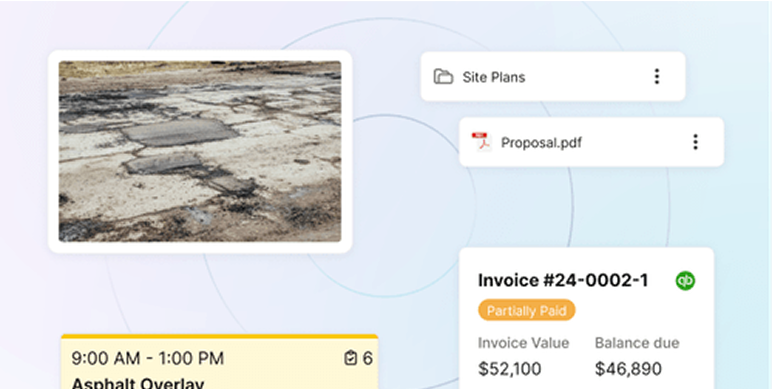Asphalt Hot Box Trailers: What to Know + 5 Top Picks in 2026
Asphalt hot box trailers solve the biggest headache facing paving contractors: Keeping material workable when you're racing against cooling temperatures.
These units maintain hot mix at working temperature for up to 48 hours, come in 2–7 ton capacities to match your crew size, and prevent the costly waste that happens when material hardens before you can use it.
These specialized asphalt trailers have become vital equipment for paving contractors who need reliable access to workable asphalt, especially during cooler months when material cools fast. In this post, we’ll go over the main brands and must-know tips when using this equipment.
Types of Asphalt Hot Boxes
Asphalt hot boxes come in three main mounting configurations, each designed for specific applications and crew sizes. Let’s zoom in on each:
- Trailer-mounted units separate trailers get towed behind trucks and come in capacities ranging from 2 to 6 tons. They work well for crews handling multiple job sites daily, as you can detach the trailer, freeing up your truck for other tasks.
- Truck-mounted hot boxes range from 2 to 10 tons and include slip-in models, permanent chassis mounting, or removable hook-lift systems for dump trucks. Skid-mounted versions range from small enough to fit in a UTV to large units for flatbed trucks.
- Stationary hot boxes stay in a fixed location, like an asphalt plant or maintenance yard. These provide a reliable storage solution for bulk material at your base of operations.
What's the difference between reclaimers vs. standard hot boxes?
Reclaimers can reheat bulk-stored virgin asphalt back to working temperature over 8–10 hours, and standard hot boxes simply maintain the temperature of already-heated material. A standard or regular hot box is for holding hot mix asphalt that's already heated and usually has insulation but no heat source.
The reclaiming process works because virgin material still contains the asphalt cement added at the plant, so it hasn't lost its chemical properties; reclaiming is the process of reheating. You can stockpile asphalt during warmer months and reheat it during winter when plants are closed.
Asphalt hot boxes: Key use cases
Hot box trailers serve lots of key functions for paving contractors:
- Pothole repair and patching: Keep material workable for emergency road repairs
- Utility cut restoration: Maintain proper temperatures for permanent utility patches
- Seasonal work extension: Enable hot repairs when asphalt plants are closed
- Material waste reduction: Reheat leftover asphalt instead of disposal
- Multi-site efficiency: Transport hot material between job locations without cooling
- Cold weather operations: Warm cold patch material to improve workability
- Bulk storage solutions: Store material at optimal temperatures for large projects
What to Look for in a Hot Box
When selecting an asphalt hot box trailer, several key features determine performance and value for your operation. Here’s what to look for:
- Capacity (1-4+ tons) affects how much material you can transport and how many trips you'll need to the plant. Most asphalt hot boxes range from 2 to 7 tons, with larger capacity reducing trips but requiring consideration of job site accessibility. A 2-ton unit works well for small crews, while 4-6 ton units suit larger operations.
- Heat source options include diesel, propane, and electric systems. Diesel burners typically provide 105,000 BTU output while propane systems offer 58,000 BTU. Diesel systems achieve 92% fuel efficiency and use less than three gallons per eight-hour shift. Propane provides cleaner burning, but requires tank refills at specialized locations.
- Discharge method determines how easily you can unload material. Gravity discharge systems use slanted walls to funnel material toward the shovel door, while hydraulic auger systems provide powered material delivery. Hydraulic dump options allow complete hopper emptying with minimal manual work.
- Crew size and vehicle compatibility impact which size and mounting style works best. Consider your truck's payload capacity, trailer towing ability, and job site access requirements. Skid-mount units require trucks with at least 5,000 lb capacity (material weight plus unit weight).
Note: Learn more about getting the most out of your investment in our asphalt recycling guide.
Top Brands and Models
Leading asphalt hot box manufacturers offer various models designed for different contractor needs and budgets. Here's a comparison of the key offering:
Note: Expand your service offerings with our detailed buyer's guide to sealcoating equipment.
New vs. Used Hot Box Trailers
New hot boxes cost more and take longer to deliver, but offer warranties, latest technology, and customization. In contrast, used units are immediately available at lower prices with minimal depreciation, but they do carry repair risks and uncertain maintenance histories.
When buying used, choose reputable dealers with complete service records. Your decision hinges on budget, timeline, and risk tolerance.
New hot box: Advantages
- Latest technology and fuel efficiency improvements
- Full manufacturer warranty (typically 2–5 years)
- Customization options for specific needs
- Modern safety features and controls
- Established parts and service network
New hot box: Disadvantages
- Higher upfront investment
- Longer delivery times for custom configurations
- Full depreciation impact on business finances
Used hot box: Advantages
- Significantly lower purchase price for 2–4 ton capacity units
- Immediate availability for faster project starts
- Proven track record of specific models
- Reduced depreciation concerns
Used hot box: Disadvantages
- Unknown maintenance history and remaining lifespan
- Potential for unexpected repair costs
- Limited warranty coverage
- Older technology may have higher fuel consumption
Where to buy used trailers
Several established dealers specialize in used asphalt hot box equipment.
- PavementGroup offers certified pre-owned equipment with rigorous 50+ point inspections, full servicing and repairs, plus field-testing under working conditions. PavementGroup carries trailer-mounted units with 2–5 yard capacity and provides 90-day parts warranties on qualifying equipment.
- Machinio provides a marketplace connecting buyers with Falcon RME, Stepp, and Marathon equipment nationwide. The platform shows detailed specifications and, depending on the seller, costs.
Local equipment dealers often carry trade-ins from contractors upgrading their fleets. Check with asphalt plant operators who may know about available equipment in your area.
Key Inspection Points
Get a qualified technician to inspect the unit before purchase so you can prevent costly surprises. This will also ensure you're buying reliable equipment for your paving operations.
When evaluating a used asphalt hot box, focus on these seven critical areas:
- Burner system condition: Check for proper ignition, flame pattern, and safety shutoffs. The burner is arguably the most important component, so verify it's fully protected and mounted above the frame rather than exposed underneath.
- Insulation integrity: Look for damaged or missing insulation that affects heat retention. Triple-wall construction with 2–3 inches of high-efficiency fiberglass insulation is standard.
- Hopper construction: Inspect for steel thickness (1/4 inch floor, 10-gauge inner panels, 12-gauge outer walls minimum) and check for warping or burn-through.
- Door operation: Test loading and discharge doors for smooth operation and proper sealing. Cantilever handles should require less than 15 lb of pressure to open.
- Trailer frame and axles: Examine for structural damage, proper brake function, and tire condition. Verify weight ratings match your intended use.
- Control systems: Test temperature controls, safety systems, and any hydraulic components for proper operation.
- Fuel system: Check tank condition, fuel lines, and connections for leaks or corrosion.
Note: Once you have the right equipment, you’ll need quality materials for long-lasting repairs. Discover which products deliver the best results in our review of the best asphalt sealcoating products for driveways.
Run Your Asphalt Crews Like Clockwork
Whether you're investing in your first asphalt hot box trailer or adding to your equipment fleet, managing the business side of paving operations doesn't have to feel chaotic.
That's where OneCrew comes in.
We built our platform specifically for paving contractors who manage crews. You need project management tools that understand your unique workflow, from equipment scheduling to material coordination. Here's why hundreds of paving contractors choose OneCrew:
- Estimating built for your equipment needs: Create accurate bids that account for your hot box capacity, crew size, and material needs. Use site plans and aerial imagery for fast takeoffs. Build templates that factor in your gear costs and win more profitable work.
- Equipment and crew scheduling that works: Assign your asphalt hot box trailer, crews, and materials to multi-day projects. Track which jobs need your equipment and when. Give your field teams mobile access to schedules and job details.
- Replace your patchwork of tools: Stop juggling 4 to 7 different systems. OneCrew consolidates your estimating, scheduling, job costing, invoicing, and reporting into one platform. Integrate with QuickBooks Online for payment processing.
- Track your real costs: Know exactly what each job costs you in equipment, labor, and materials. Identify which projects make money and which don't. Price future jobs with confidence using actual historical data.
Ready to run your paving business with confidence? Join the paving contractors who've upgraded their operations with OneCrew. Book a free demo to see how OneCrew can help you manage your equipment, crews, and projects more effectively.
FAQs
1. What is an asphalt hot box trailer?
An asphalt hot box trailer is a specialized insulated container that keeps hot mix asphalt at working temperature for up to 48 hours during transport and storage. They use diesel or propane burners to keep optimal asphalt temperature, preventing waste.
2. What size hot box do I need?
Most contractors choose hot boxes sized between 2 and 7 ton capacity units. A 2-ton unit works well for small crews doing pothole repairs, and a 4–6 ton units suit larger operations. The size hot box you need depends on your typical job scope and crew size.
3. Are electric or diesel hot boxes better?
Diesel hot boxes are generally better than electric models because they provide higher BTU output and work independently of electrical connections at job sites. Electric units require power sources and typically have lower heating capacity.
4. How do I maintain an asphalt hot box?
You maintain an asphalt hot box by regularly cleaning the hopper, inspecting burner components for proper operation, and checking insulation for damage or wear. Replace worn door seals and test temperature controls for accurate heating.
5. Can I tow a hot box with a standard pickup?
You can tow smaller hot box trailers (2–3 ton capacity) with a standard pickup truck, but you need to verify your vehicle's towing capacity and tongue weight limits.
6. How does OneCrew help with asphalt equipment management?
OneCrew helps with asphalt equipment management by letting you schedule equipment like hot box trailers alongside crews and materials for multi-day paving projects. The platform tracks costs in job estimates and provides job costing to show equipment expenses versus budgets.


